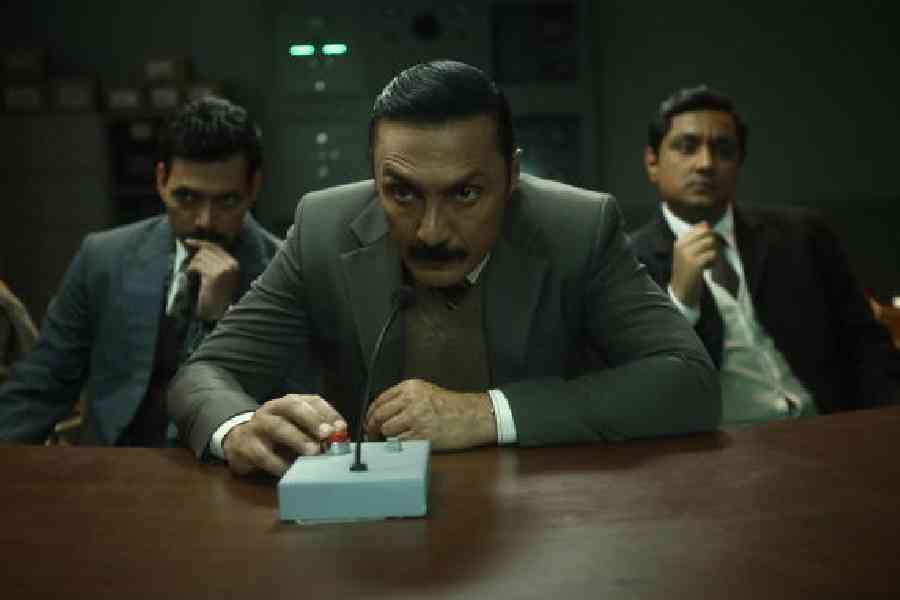It is tough to catch Rahul Bose unawares about the goings-on in Calcutta. “I go there almost every two weeks. Our camps are underway at SAI (Sports Authority of India complex in Salt Lake), all four of them — under-18 boys and girls as well as men and women — for the Asian Championships that will be held in Nepal and Malaysia in September-October,” says the president of Rugby India, who has played in the national team for 11 years till he hung up his boots in 2009. Switching from sports administrator to actor mode, he shares his thoughts on his film Berlin that is screening currently on Zee5 and looks back on his 30-year journey on screen since his debut film English, August.
The film deals with a plot to assassinate the Russian president. So why is it called Berlin?
I can’t reveal that to keep the mystery. Without what Berlin stands for in the movie, there would be no movie. Berlin is a concept in time where, because of its eminence, this entire movie is written. It is more a confluence of thoughts, actions and ideas than the city in Germany. It stands for something.
You are the investigating officer. Tell us about your role.
There is a kind of urgency, even desperation, on the part of my character to ascertain the truth. The reason for this desperation becomes increasingly apparent as the film moves on but is not fully clear till the end. This film works more in the silences and the shadows. It is a very tightly edited suspense, psychological thriller. It is not a James Bond type thriller, where you are on a glacier in Iceland and the next day you are running through the tropical forests in Borneo.
So much of it happens in the interrogation room?
Correct. You start to wonder if everyone is what one seems like or if there is something else. And this interiority of these characters pulls you in.
Does the fact that the person being interrogated, Ishwak Singh’s character, is speech and hearing impaired, lend an edge to the silence?
Definitely. It lends an edge, a colour and a mystery.
Your only conduit to him is the sign language interpreter. So it must be very frustrating for you to see Ishwak’s expressions but not being able to interpret what he is saying.
Exactly. It is the frustration all of us feel when we are in a room with somebody whose language we don’t understand but we desperately want to know what he said. That helplessness is alien to Sondhi, my character, who is used to being in control.
In one shot in the trailer, it seems he vents his frustration on the interpretator.
Ta toh hobei. If you are getting frustrated, you will automatically lash out at the softest target.
Is there a backstory to the chacracters?
The two boys have — Apar (Aparshakti Khurana) and Ishwak. Not my character. I think Atul wanted Sondhi to be exactly what he is without humanising him. What backstories do is they humanise characters. They give context, reason, justification... he didn’t want to give that pleasure to Sondhi.
How would you describe the character?
Survivor. The world may destroy itself but he has to survive.
You spoke of an urgency. If the plot is about the Russian president, the visit date itself would be cause of urgency to crack the case, isn’t it?
That would be one reason. But there could be other more personal reasons for Sondhi’s urgency.
It’s 30 years of English, August, when you emerged as the face of the English-speaking bilingual middle class, who despite being the leading man is not the conventional hero. How do you look back to that time?
With a great deal of gratitude and fondness. I am so lucky to be at that place in the cultural landscape of India, to have a lead role in a film like that which will forever remain one of the milestones of popular culture. I consider myself lucky in all the punctuation marks in my career — English, August, Split Wide Open, Takshak, Everybody Says I am Fine, Mr and Mrs Iyer, Jhankar Beats, Pyar ke Side Effects, Shaurya; in Bengali cinema, Anuranan, Antaheen, The Japanese Wife, Kalpurush; in Tamil cinema, Vishwaroopam... in English cinema, practically every second film being done was being cast with me. From there to Bulbbul and Berlin. These will remain the 10-15 punctuation marks in my career, which are its highlights.
This is also 20 years of Jhankaar Beats. Did it take your career to a more mainstream lane?
No. My career has always been in my hands. I have never done a sequel. I am not in that game to create a fan following. I am in the game to keep discovering and trying new genres — courtroom drama Shaurya, romantic comedy Pyar ke Side Effects, buddy flick Jhankaar Beats… all my mainstream attempts have been in different genres to which I have never gone back.
You recently posted on Instagram about being back on stage for a film. Which film was that for?
It’s a film called Madam Sengupta with Rituparna (Sengupta). It’s a thriller. Then there is a film coming up called Noti Binodini, where Rukmini Maitra is playing Binodini. It’s a biopic. I am playing Ranga Babu.
In the post, you mentioned the play Art having been your last venture on stage.
I don’t miss being on stage. I consciously made a decision to stop doing theatre in 2000. Theatre wasn’t growing in the English language and the audiences were not growing either. I could not see myself doing this for the rest of my life.











